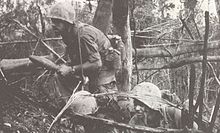| Operation Prairie | |||||||
|---|---|---|---|---|---|---|---|
| Part of the Vietnam War | |||||||
 U.S. Marines from 3rd Battalion, 4th Marines during Operation Prairie. | |||||||
| |||||||
| Belligerents | |||||||
|
|
| ||||||
| Commanders and leaders | |||||||
|
LG Lew Walt MG Wood B. Kyle BG Lowell English Col. Alexander D. Cereghino Lt Col. Arnold E. Bench Lt Col. William J. Masterpool | |||||||
| Units involved | |||||||
| 3rd Marine Division[1] | 324B Division | ||||||
| Casualties and losses | |||||||
|
226 killed[1] At least 5 helicopters shot down[2][3] |
US body count: 1,329 killed 1,713 estimated killed 27 captured[1] 248 weapons recovered[4] | ||||||
Operation Prairie was a U.S. military operation in Quảng Trị Province, South Vietnam that sought to eliminate People's Army of Vietnam (PAVN) forces south of the Demilitarized Zone (DMZ). Over the course of late 1965 and early 1966 the Viet Cong (VC) and the PAVN intensified their military threat along the DMZ. The tactical goal of these incursions was to draw United States military forces away from cities and towns. Operation Hastings, a series of actions in defense of the DMZ, lasted from 15 July to 3 August 1966. It was considered a strategic success. Operation Prairie was conceived as a larger, longer mission covering the same areas along the DMZ.
It commenced on 3 August 1966 and lasted for six months. The majority of the activities were conducted by the 3rd Marine Division in the Con Thien and Gio Linh regions with the main objective of stopping the PAVN 324B Division from crossing the demilitarized zone and invading Quang Tri Province.
Various units engaged in fiercely fought actions during the operation, usually supported by a mixture of artillery, air and helicopter gunship support, sometimes including B-52 strategic bombers. By November the 324B Division had been withdrawn after heavy losses. It was replaced by other PAVN units, but these remained inactive.
The operation was considered highly successful by the Americans. They had lost 226 Marines killed against estimated PAVN of over 1,700 dead or captured and suppressed PAVN activity. However, the PAVN strategy had tied down large numbers of US troops in the area south of the DMZ, leaving population centers under-protected.
- ^ a b c d "Operation Prairie" (PDF). U.S. operation report. Retrieved 26 November 2014.
- ^ Fails, William R. (1978). Marines & Helicopters, 1962–1973. Washington D.C.: History and Museums Division, Headquarters U.S. Marine Corps. p. 111. ISBN 9780788118180.
- ^ Coan, James P. (2004). Con Thien: The Hill of Angels. Tuscaloosa, Alabama: University of Alabama Press. p. 49. ISBN 9780817314149.
- ^ "Declassified" (PDF). Texas Tech University. Archived from the original (PDF) on 12 June 2018. [page needed]
